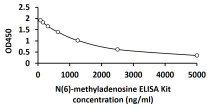ARG83375
N(6)-methyladenosine ELISA Kit
N(6)-methyladenosine ELISA Kit for Functional study and All
Nucleosides, Purines, Hydroxymethyl compounds
Overview
| Product Description | ARG83375 N(6)-methyladenosine ELISA Kit is an Enzyme Immunoassay kit for the quantification of N(6)-methyladenosine in Serum, Plasma, Urine Cell lysate and Tissue lysate. |
|---|---|
| Tested Reactivity | All |
| Tested Application | FuncSt |
| Target Name | N(6)-methyladenosine |
| Conjugation | HRP |
| Conjugation Note | Read at 450 nm. |
| Sensitivity | 40 ng/mL |
| Sample Type | Serum, Plasma, Urine Cell lysate and Tissue lysate. |
| Standard Range | 5000 - 78 ng/mL |
| Sample Volume | 50 µL |
Application Instructions
| Assay Time | ~3 hours |
|---|
Properties
| Form | 96 well |
|---|---|
| Storage Instruction | Store components at -20°C and -80°C. Keep microplate wells sealed in a dry bag with desiccants. Do not expose test reagents to heat, sun or strong light during storage and usage. Please refer to the product user manual for detail temperatures of the components. |
| Note | For laboratory research only, not for drug, diagnostic or other use. |
Bioinformation
| Background | The methylation of adenosine is directed by a large m6A methyltransferase complex containing METTL3, which is the subunit that binds S-adenosyl-L-methionine . In vitro, this methyltransferase complex preferentially methylates RNA oligonucleotides containing GGACU and a similar preference was identified in vivo in mapped m6A sites in Rous sarcoma virus genomic RNA and in bovine prolactin mRNA. More recent studies have characterized other key components of the m6A methyltransferase complex in mammals, including METTL14, Wilms tumor 1 associated protein (WTAP), VIRMA and METTL5. Following a 2010 speculation of m6A in mRNA being dynamic and reversible, the discovery of the first m6A demethylase, fat mass and obesity-associated protein (FTO) in 2011 confirmed this hypothesis and revitalized the interests in the study of m6A. A second m6A demethylase alkB homolog 5 (ALKBH5) was later discovered as well. |
|---|---|
| Function | The linkages between m6A and numerous cancer types have been indicated in reports that include stomach cancer, prostate cancer, breast cancer, pancreatic cancer, kidney cancer, mesothelioma, sarcoma, and leukaemia.The impacts of m6A on cancer cell proliferation might be much more profound with more data emerging. The depletion of METTL3 is known to cause apoptosis of cancer cells and reduce invasiveness of cancer cells, while the activation of ALKBH5 by hypoxia was shown to cause cancer stem cell enrichment. m6A has also been indicated in the regulation of energy homeostasis and obesity, as FTO is a key regulatory gene for energy metabolism and obesity. SNPs of FTO have been shown to associate with body mass index in human populations and occurrence of obesity and diabetes. The influence of FTO on pre-adipocyte differentiation has been suggested. The connection between m6A and neuronal disorders has also been studied. For instance, neurodegenerative diseases may be affected by m6A as the cognate dopamine signalling was shown to be dependent on FTO and correct m6A methylation on key signalling transcripts. The mutations in HNRNPA2B1, a potential reader of m6A, have been known to cause neurodegeneration. The IGF2BP1–3, a novel class of m6A reader, has oncogenic functions. IGF2BP1–3 knockdown or knockout decreased MYC protein expression, cell proliferation and colony formation in human cancer cell lines. The ZC3H13, a member of the m6A methyltransferase complex, markedly inhibited colorectal cancer cells growth when knocked down. |
| Highlight | Related news: m6A reader YTHDF2 in mRNA decay and aggresome formation; |
| Research Area | Nucleosides, Purines, Hydroxymethyl compounds |
Images (1) Click the Picture to Zoom In
| Title | Download Link |
|---|---|
| ARG83375 N(6)-methyladenosine ELISA Kit User manual |
 Download Download
|






